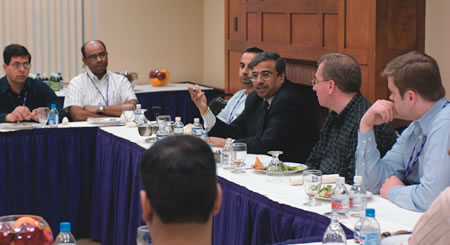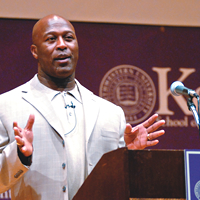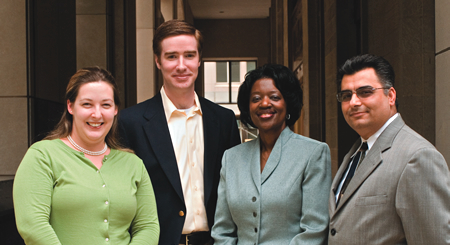The
culture of TMP brings learning to life
1 | 2
A total
experience
The
TMP staff has taken a number of steps in recent years to nurture
that connection. Most significant was the creation in 2002
of a full-time staff position charged with the development
of TMP student life. To fill the post, Lyons chose Assistant
Dean and Director of Student Affairs Megan Byrne Krueger
'90, at that time the school's director of alumni relations.
"We
were keeping up with registration and activities, but we really
wanted someone to focus on the student experience here,"
Lyons says. "We felt that was important in building a
sense of community at TMP."
 |
| Open
communication between students and administrators is key
to building an entrepreneurial culture that creates dynamic
learning opportunities at Kellogg. Here, Dean Dipak
C. Jain and, to his immediate left, Professor Robert
Korajczyk meet with TMP students over dinner to exchange
ideas. Photo
© Nathan Mandell |
| |
Some
of the changes Krueger has instituted may seem modest but
prove significant. For example, TMP now publishes a printed
directory with students' photos and contact information. It
also publicly salutes graduating students on the video screens
in school hallways and posts their photos on the community
bulletin board.
Other
changes have reached deeper into the TMP culture. The most
significant has been the creation of an orientation experience
for part-time students. The goal, Krueger explains, was to
build the same esprit de corps among the part-timers as the
September Pre-Term orientation does for the full-time class.
"TMP
students want the full MBA experience," says Krueger,
herself a TMP alum. "They want the networking, they want
the teams, they want the activities. Pre-Term sets that tone
for the full-time program, and we felt the part-time students
deserved that same sort of bonding experience."
But
how to create that feeling among busy students working through
the two-and-a-half to five-year program at their own pace?
The answer was to break the orientation into units that would
occur at different points during their time at TMP.
The
result is "Conceptual Issues for the Manager," a
program sequence that occurs during each of a student's first
three quarters in The Managers' Program. The series includes
academic workshops, feedback sessions and leadership self-assessment.
"This lets them start with a core group of people who
they will know as they go forward," Krueger says.
After
the students have finished their core coursework — usually
about five or six quarters into the TMP program — they
can participate in TMP's Symposium on Managerial Leadership,
which brings in top faculty and business figures to discuss
current leadership issues. They can also take part in TMP's
Professional Development Series, which highlights career-building
skills like interviewing and résumé writing.
"It's
an opportunity for students to work on the skills that will
help them get to the next level in their career," Krueger
says. "It helps them think about what their next steps
are and how to take them effectively."
Finally,
as students approach graduation, they are invited to take
part in activities designed to engender a "class"
spirit among students who may never have taken a course together.
These include fall and winter social events for those who
expect to graduate in the spring, and the selection of a graduation
committee to coordinate a class gift and other commencement
activities.
Emily
Brinkmoeller is among those who have taken advantage of
TMP's community-building activities. In addition to serving
on the class gift committee, she has participated on the board
of the Women's Business Association and chaired the silent
auction fundraising efforts for The Managers' Ball.
"When
I was investigating MBA programs, one of the things I liked
about Kellogg was that it offered this well-rounded education,"
says Brinkmoeller, director of trade and business development
for the World Trade Center Chicago.
"I
had heard that you get out of it what you put into it. So
I made the decision at the beginning to get as much out of
it as possible."
Brinkmoeller
notes that when she enrolled at Kellogg, she was a relative
newcomer to Chicago, having moved to the city from Kentucky.
Participating in extracurricular events, such as trips to
Wrigley Field, evenings on the town and weekend leadership
seminars, soon helped her to feel at home.
 |
|
| Lovie
Smith, coach of the Chicago Bears, spoke at The Managers'
Program May 17. His appearance was part of the Kellogg
Symposium on Managerial Leadership series. Photo
© Mary Hanlon |
|
| |
|
"I
definitely get the sense that Kellogg is a community,"
Brinkmoeller says. "There's so much to pick and choose
from in terms of activities. If you make any effort at all
to get involved, you're going to come out with a strong network.
I feel like I've made some of my best friends here."
Lyons
says TMP is already reaping the return on its investment in
student culture. The vast majority of graduating students
return to Kellogg to participate in commencement ceremonies
— no small achievement, considering that many had completed
their coursework up to nine months earlier.
"Even
though they may have finished in the fall, they want to graduate
with their class," Lyons says. "They've formed relationships
with each other and they want to celebrate together."
They
also want to reconnect with their professors and the TMP staff.
Lyons and his colleagues say they enjoy unusually close relationships
with TMP students, in part because the life of a part-time
student can be so complex.
"We're
addressing academic and professional and often even personal
needs," Krueger says. "That's the kind of relationship
we've built. Students often just want to come in and talk
about things going on in their lives, which I think is great
because it strengthens the sense of community.
Francis,
too, finds that her listening skills are often called upon
as she registers students and advises them on their course
choices.
"If
they're going through some sort of a crisis at work or at
home, they let me know," says Francis. "Sometimes
an emergency might come up, and they start to panic and say,
'I can't do this — work and school. I can't do it.'
They need to have someone reassure them that it can be done.
I listen to them, and I help relieve their stress so that
they can get back to work.
"These
are working families. They need to know that after a stressful
day, someone is there for them."
One
2006 graduate who can attest to that support is Mark Bumby.
In April 2002, Bumby was on his way home from a TMP class
when he stopped to help a fellow motorist change a flat tire.
He was struck by a car, and both of his legs were crushed.
Bumby withdrew from Kellogg to recover from his injuries.
He faced several years of rehabilitation and more than 20
separate surgeries to repair his legs.
 |
| Always
there for students. The supportive TMP team includes,
from left, Assistant Director of Admissions Emily Selden;
Assistant Director of Student Services Patrick McCarthy;
Associate Director and Registrar Sarah Francis; and Manager
of Technology for TMP Amish Thakker Photo
© Nathan Mandell |
| |
About
six months into his recovery, Bumby decided he wanted to return
to The Managers' Program. "It was something I needed
to be doing to keep my mind active," Bumby says. "I
really enjoyed Kellogg and I needed the challenge." The
TMP staff was there for him, he says, every step of the way.
"There
was the emotional support, and the understanding," Bumby
says. "If I needed closer parking to the school or some
extra time to complete my assignments, everyone understood.
I knew that if I needed anything, they were there. I can't
overstate the magnitude of the help the TMP staff was willing
to provide in my recovery."
That
support — from the staff, faculty and other students
— helps students emerge from The Managers' Program with
arguably the best of all worlds: a strong professional and
social network, a lifelong connection to Kellogg and a career
that often blossoms with the development of new management
skills.
"Every
single day, I can bring some lesson in organization behavior
or management back to my job," Brinkmoeller says. "You
can always turn around and use something from your last lecture
to build your team or motivate your employees. By using it
right away, you reinforce it. I don't understand why anyone
would choose to get their MBA any other way."
For
Lyons, that's enough of a reward to justify his 34-year tenure
at The Managers' Program. He knows students such as Brinkmoeller
will stay connected to Kellogg, and that their careers will
thrive as a result of their time at TMP.
"There's
nothing like getting to know the new students, watching them
go through the program and seeing them come back after they
graduate," he says. "You get to see what they're
doing professionally. You see how they've developed, and you
can take a lot of pride in the value that Kellogg has clearly
given them." |



